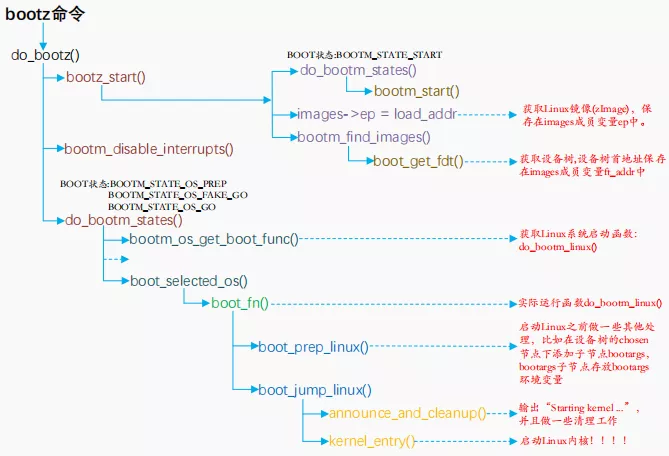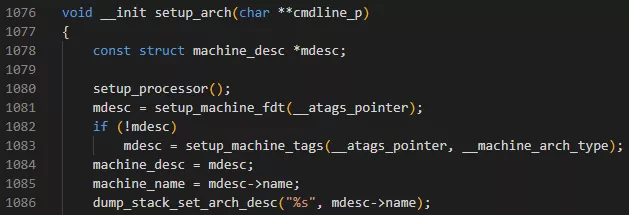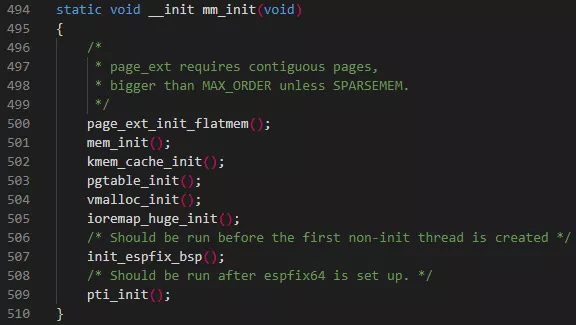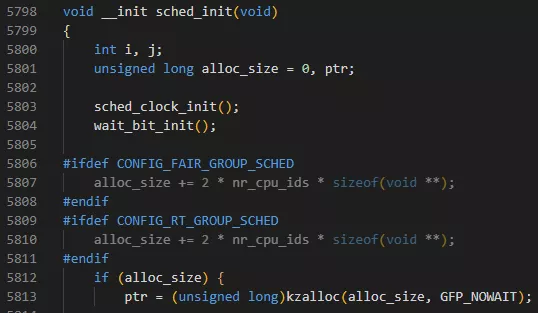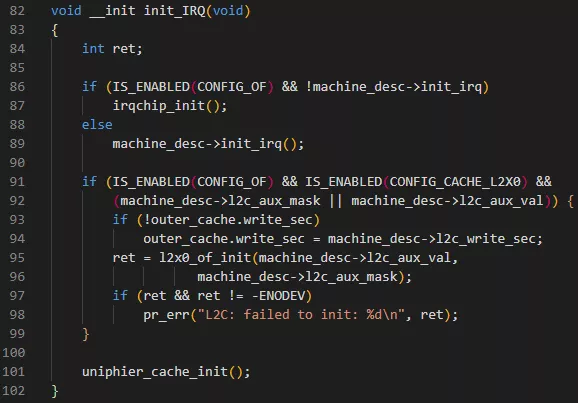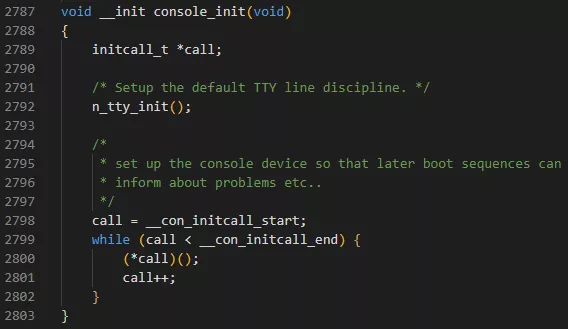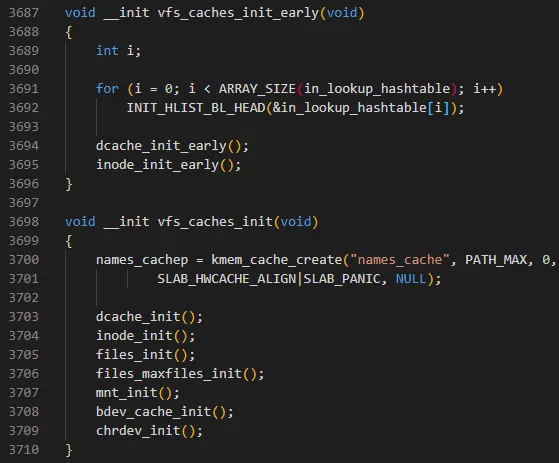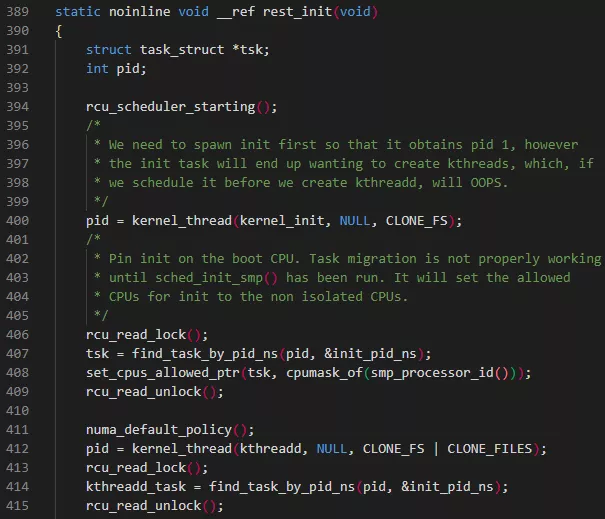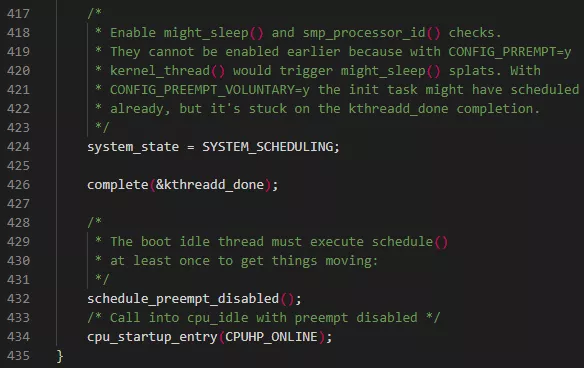下载 Linux 内核网址:
https://www.kernel.org/
最新 Linux 内核是 5.15 版本。现在常用 Linux 内核源码为4.14、4.19、4.9 等版本,其中 4.14 版本源码压缩包大概 90+M,解压后 700+M,合计 61350 个文件。如此众多的文件,用 source insight 或者 VSCode 查看都会比较卡,所以可以采用在线查看的方式。
在线查看 Linux 内核源码网址:
https://elixir.bootlin.com/linux/latest/source
在线查看 Android 源码:
http://androidxref.com/
Android系统是基于Linux 内核的,最底层为Linux内核,源码量翻很多倍。所以用软件看安卓源码更卡,可以使用在线网址看源码。
我们知道,Linux 系统的启动,前面有一个启动引导程序 bootloader,比如常用的 uboot,本文不分析 uboot 的启动,只放一张流程图:
本文主要讲解当从 bootloader 跳转到 Linux 系统的启动函数 start_kernel 后,此函数对系统初始化的流程。
在 linux4.14/arch/arm/kernel/head.S 文件中,是最后汇编阶段的初始化,而后会跳转到 main.c 文件的 start_kernel 函数,在此做 Linux 启动初始化,在这个函数中会调用将近100个函数去完成 Linux 系统的初始化,调用函数如下(不同内核版本,顺序和细节有变化):
linux4.14/init/main.c,start_kernel 函数。
- asmlinkage __visible void __init start_kernel(void)
- {
- char *command_line;
- char *after_dashes;
- set_task_stack_end_magic(&init_task);
- smp_setup_processor_id();
- debug_objects_early_init();
- cgroup_init_early();
- local_irq_disable();
- early_boot_irqs_disabled = true;
- /*
- * Interrupts are still disabled. Do necessary setups, then
- * enable them.
- */
- boot_cpu_init();
- page_address_init();
- pr_notice("%s", linux_banner);
- setup_arch(&command_line);
- /*
- * Set up the the initial canary and entropy after arch
- * and after adding latent and command line entropy.
- */
- add_latent_entropy();
- add_device_randomness(command_line, strlen(command_line));
- boot_init_stack_canary();
- mm_init_cpumask(&init_mm);
- setup_command_line(command_line);
- setup_nr_cpu_ids();
- setup_per_cpu_areas();
- smp_prepare_boot_cpu(); /* arch-specific boot-cpu hooks */
- boot_cpu_hotplug_init();
- build_all_zonelists(NULL);
- page_alloc_init();
- pr_notice("Kernel command line: %s\n", boot_command_line);
- /* parameters may set static keys */
- jump_label_init();
- parse_early_param();
- after_dashes = parse_args("Booting kernel",
- static_command_line, __start___param,
- __stop___param - __start___param,
- -1, -1, NULL, &unknown_bootoption);
- if (!IS_ERR_OR_NULL(after_dashes))
- parse_args("Setting init args", after_dashes, NULL, 0, -1, -1,
- NULL, set_init_arg);
- /*
- * These use large bootmem allocations and must precede
- * kmem_cache_init()
- */
- setup_log_buf(0);
- pidhash_init();
- vfs_caches_init_early();
- sort_main_extable();
- trap_init();
- mm_init();
- ftrace_init();
- /* trace_printk can be enabled here */
- early_trace_init();
- /*
- * Set up the scheduler prior starting any interrupts (such as the
- * timer interrupt). Full topology setup happens at smp_init()
- * time - but meanwhile we still have a functioning scheduler.
- */
- sched_init();
- /*
- * Disable preemption - early bootup scheduling is extremely
- * fragile until we cpu_idle() for the first time.
- */
- preempt_disable();
- if (WARN(!irqs_disabled(),
- "Interrupts were enabled *very* early, fixing it\n"))
- local_irq_disable();
- radix_tree_init();
- /*
- * Allow workqueue creation and work item queueing/cancelling
- * early. Work item execution depends on kthreads and starts after
- * workqueue_init().
- */
- workqueue_init_early();
- rcu_init();
- /* Trace events are available after this */
- trace_init();
- context_tracking_init();
- /* init some links before init_ISA_irqs() */
- early_irq_init();
- init_IRQ();
- tick_init();
- rcu_init_nohz();
- init_timers();
- hrtimers_init();
- softirq_init();
- timekeeping_init();
- time_init();
- sched_clock_postinit();
- printk_safe_init();
- perf_event_init();
- profile_init();
- call_function_init();
- WARN(!irqs_disabled(), "Interrupts were enabled early\n");
- early_boot_irqs_disabled = false;
- local_irq_enable();
- kmem_cache_init_late();
- /*
- * HACK ALERT! This is early. We're enabling the console before
- * we've done PCI setups etc, and console_init() must be aware of
- * this. But we do want output early, in case something goes wrong.
- */
- console_init();
- if (panic_later)
- panic("Too many boot %s vars at `%s'", panic_later,
- panic_param);
- lockdep_info();
- /*
- * Need to run this when irqs are enabled, because it wants
- * to self-test [hard/soft]-irqs on/off lock inversion bugs
- * too:
- */
- locking_selftest();
- /*
- * This needs to be called before any devices perform DMA
- * operations that might use the SWIOTLB bounce buffers. It will
- * mark the bounce buffers as decrypted so that their usage will
- * not cause "plain-text" data to be decrypted when accessed.
- */
- mem_encrypt_init();
- #ifdef CONFIG_BLK_DEV_INITRD
- if (initrd_start && !initrd_below_start_ok &&
- page_to_pfn(virt_to_page((void *)initrd_start)) < min_low_pfn) {
- pr_crit("initrd overwritten (0x%08lx < 0x%08lx) - disabling it.\n",
- page_to_pfn(virt_to_page((void *)initrd_start)),
- min_low_pfn);
- initrd_start = 0;
- }
- #endif
- kmemleak_init();
- debug_objects_mem_init();
- setup_per_cpu_pageset();
- numa_policy_init();
- if (late_time_init)
- late_time_init();
- calibrate_delay();
- pidmap_init();
- anon_vma_init();
- acpi_early_init();
- #ifdef CONFIG_X86
- if (efi_enabled(EFI_RUNTIME_SERVICES))
- efi_enter_virtual_mode();
- #endif
- thread_stack_cache_init();
- cred_init();
- fork_init();
- proc_caches_init();
- buffer_init();
- key_init();
- security_init();
- dbg_late_init();
- vfs_caches_init();
- pagecache_init();
- signals_init();
- proc_root_init();
- nsfs_init();
- cpuset_init();
- cgroup_init();
- taskstats_init_early();
- delayacct_init();
- check_bugs();
- acpi_subsystem_init();
- arch_post_acpi_subsys_init();
- sfi_init_late();
- if (efi_enabled(EFI_RUNTIME_SERVICES)) {
- efi_free_boot_services();
- }
- /* Do the rest non-__init'ed, we're now alive */
- rest_init();
- prevent_tail_call_optimization();
- }
其中有七个函数较为重要,分别为:
- setup_arch(&command_line);
- mm_init();
- sched_init();
- init_IRQ();
- console_init();
- vfs_caches_init();
- rest_init();
1、setup_arch(&command_line)
此函数是系统架构初始化函数,处理 uboot 传递进来的参数,不同的架构进行不同的初始化,也就是说每个架构都会有一个 setup_arch 函数。
linux4.14/arch/arm/kernel/setup.c
2、mm_init
内存初始化函数
linux4.14/init/main.c
3、sched_init
核心进程调度器初始化。Linux 内核实现了四种调度方式,一般是采用 CFS 调度方式。作为一个普适性的操作系统,必须考虑各种需求,我们不能只按照中断优先级或者时间轮转片来规定进程运行的时间。作为一个多用户操作系统,必须考虑到每个用户的公平性。不能因为一个用户没有高级权限,就限制他的进程的运行时间,要考虑每个用户拥有公平的时间。
linux4.14/kernel/sched/core.c
4、init_IRQ
中断初始化函数,这个很好理解,大家都用过中断。
linux4.14/arch/arm/kernel/irq.c
5、console_init
在这个函数初始化之前,你所有写的内核打印函数 printk 都打印不出东西。在这个函数初始化之前,所有打印都会存在 buf 里,此函数初始化以后,会将 buf里面的数据打印出来,你才能在终端看到 printk 打印的东西。
tty 是 Linux 中的终端, _con_initcall_start 和_con_initcall_end 这两句的意思是执行所有两者之间的 initcall 函数。
linux4.14/kernel/printk/printk.c
6、vfs_caches_init
虚拟文件系统初始化,比如 sysfs,根文件系统等,就是在这一步进行挂载,proc 是内核虚拟的,用来输出内核数据结构信息,不算在这里。
vfs虚拟文件系统,屏蔽了底层硬件的不同,提供了统一了接口,方便系统的移植和使用。使用户在不用更改应用代码的情况下直接移植代码到其他平台。
linux4.14/fs/dcache.c
这里的挂载主要在mnt_init()函数中:
linux4.14/fs/namespace.c
7、rest_init
这个函数可以算是 start_kernel函数调用的最后一个函数,在这里产生了最重要的两个内核进程 kernel_init 和 kthreadd,kernel_init后面会从内核空间跳转到用户空间,变成用户空间的 init 进程,PID=1,而 kthreadd ,PID=2,是内核进程,专门用来监听创建内核进程的请求,它维护了一个链表,如果有创建内核进程的需求,就会在链表上创建。
至此,用户空间最重要的 init 进程已经出来,后面用户空间的进程都由 init进程来 fork。如果是安卓系统,init 进程会 fork 出一个 zygote 进程,他是所有安卓系统进程的父进程。
linux4.14/init.main.c
上图,400 行创建了 kernel_init 进程,412 行创建了 kthreadd 进程,这两个都是内核进程。426 行通知 kernel_init 进程 kthreadd 已经创建完毕。也就是说,实际上是 kthreadd 先运行,kernel_init 再运行。
其余的函数大家可以参照下面的文章去理解:
https://www.cnblogs.com/andyfly/p/9410441.html
https://www.cnblogs.com/lifexy/p/7366782.html
https://www.cnblogs.com/yanzs/p/13910344.html#radix_tree:init
本文转载自微信公众号「嵌入式Linux系统开发」














